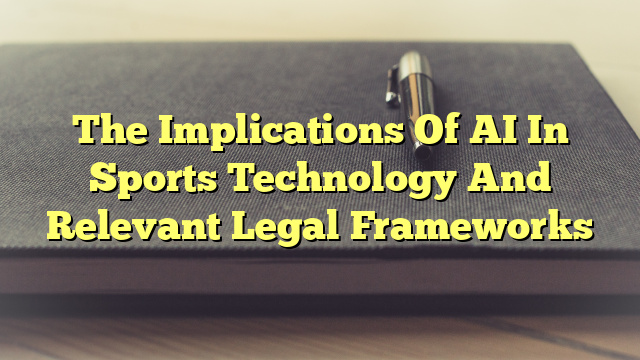Table of Contents
Legal Implications of AI
Artificial Intelligence (AI) has become increasingly prevalent in various industries, including sports. However, its implementation raises several legal implications. One major concern is the potential infringement of intellectual property rights. AI algorithms may analyze and process vast amounts of data, including copyrighted material, without proper authorization.
Another legal consideration is privacy and data protection. AI systems often collect and analyze personal data, such as athletes’ performance metrics and health records. Organizations must ensure compliance with relevant data protection laws and obtain informed consent from individuals.
Additionally, liability issues arise when AI technology is involved. If an AI system makes a decision that leads to harm or injury, determining responsibility can be challenging. Establishing clear liability frameworks and accountability mechanisms is crucial to address these concerns.
Impact of AI on the Sports Industry
The integration of AI in the sports industry has revolutionized various aspects, from player performance analysis to fan engagement. AI-powered technologies can analyze vast amounts of data in real-time, providing valuable insights to coaches, players, and teams.
AI algorithms can enhance training programs by identifying patterns, predicting injuries, and optimizing performance. Athletes can receive personalized recommendations and feedback based on their unique data. This technology also enables the development of virtual training environments and simulations.
Furthermore, AI has transformed the fan experience. Virtual reality (VR) and augmented reality (AR) technologies allow fans to immerse themselves in the game, providing a more interactive and engaging experience. AI-powered chatbots and virtual assistants enhance customer service and provide personalized recommendations.
Ethical Concerns of AI in Sports
While AI brings numerous benefits to the sports industry, it also raises ethical concerns. One major issue is the potential for bias in AI algorithms. If the training data used to develop AI systems is biased, it can perpetuate existing inequalities and discrimination.
Another ethical consideration is the impact of AI on employment. As AI technology automates certain tasks, it may lead to job displacement for individuals in sports-related professions. Ensuring a fair transition and providing opportunities for reskilling and upskilling is vital.
Additionally, AI raises questions about fairness and competitive advantage. If certain teams or athletes have access to superior AI technologies, it may create an uneven playing field. Striking a balance between technological advancements and maintaining fair competition is a challenge.
Legal and Ethical Issues of AI
The legal and ethical issues surrounding AI in sports intersect in various areas. Transparency and explainability are crucial aspects. Organizations must ensure that AI systems are transparent, and decisions made by AI algorithms can be explained and justified.
Intellectual property rights and data protection also present combined legal and ethical challenges. Organizations must respect copyright laws and protect individuals’ personal data while leveraging AI technology.
Furthermore, accountability and liability frameworks need to be established to address potential harm caused by AI systems. Clear guidelines on responsibility and liability allocation are necessary to protect individuals and organizations.

